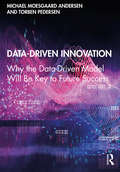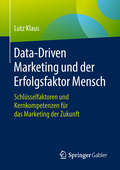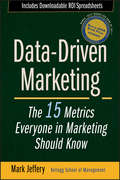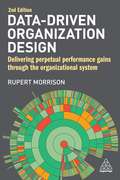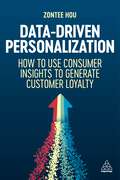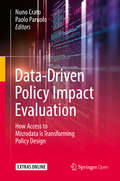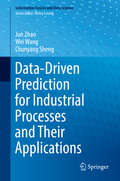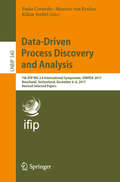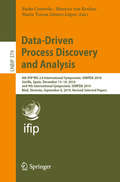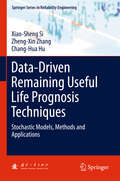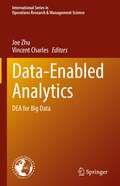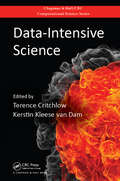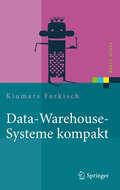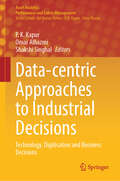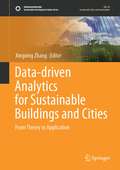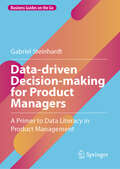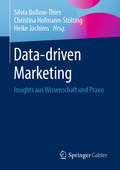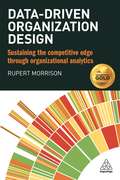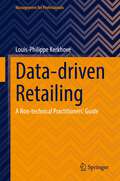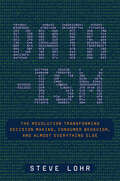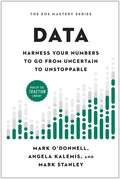- Table View
- List View
Data-Driven Innovation: Why the Data-Driven Model Will Be Key to Future Success
by Torben Pedersen Michael Moesgaard AndersenToday, innovation does not just occur in large and incumbent R&D organizations. Instead, it often emerges from the start-up community. In the new innovation economy, the key is to quickly find pieces of innovation, some of which may already be developed. Therefore, there is the need for more advanced means of searching and identifying innovation wherever it may occurs. We point to the importance of data-driven innovation based on digital platforms, as their footprints are growing rapidly and in sync with the shift from analogue to digital innovation workflows. This book offers companies insights on paths to business success and tools that will help them find the right route through the various options when it comes to the digital platforms where innovations may be discovered and from which value may be appropriated. The world hungers for growth and one of the most important vehicles for growth is innovation. In light of the new digital platforms from which data-driven innovation can be extracted, major parts of analogue workflows will be substituted with digital workflows. Data-driven innovation and digital innovation workflows are here to stay. Are you?
Data-Driven Marketing und der Erfolgsfaktor Mensch: Schlüsselfaktoren und Kernkompetenzen für das Marketing der Zukunft
by Lutz KlausDaten, Daten, Daten – und was ist mit Menschen? Bei der Digitalisierung von Prozessen und Geschäftsmodellen werden datengetriebene Ansätze und Technologien immer bedeutender. Doch der entscheidende Faktor für den Geschäftserfolg ist der Mensch, der die Daten nutzt und Prozesse mit Leben füllt. Dieses kompakte Buch richtet sich an Marketingprofis, Verantwortliche für Digitalisierung, Personalleiter sowie an alle, die datengetriebene, analytische Ansätze als Erfolgsvoraussetzung sehen und die Zukunft in der digitalen Arbeitswelt verantwortlich gestalten wollen. Der Autor stellt einen Bezugsrahmen mit sieben Punkten vor, mit dem es gelingt, sich und andere auf die Zukunft in der von Technologie geprägten Welt vorzubereiten. Anhand konkreter Beispiele wird deutlich, warum analytisches Denken, Neugier und Integration zentrale Fähigkeiten im Marketing sind und an welchen Stellen die Agilität gesteigert werden muss. Der Leser profitiert von anwendbarem Wissen, handfesten Tipps und Hinweisen zur Umsetzung in der Praxis.
Data-Driven Marketing: The 15 Metrics Everyone In Marketing Should Know
by Mark JefferyNAMED BEST MARKETING BOOK OF 2011 BY THE AMERICAN MARKETING ASSOCIATIONHow organizations can deliver significant performance gains through strategic investment in marketingIn the new era of tight marketing budgets, no organization can continue to spend on marketing without knowing what's working and what's wasted. Data-driven marketing improves efficiency and effectiveness of marketing expenditures across the spectrum of marketing activities from branding and awareness, trail and loyalty, to new product launch and Internet marketing. Based on new research from the Kellogg School of Management, this book is a clear and convincing guide to using a more rigorous, data-driven strategic approach to deliver significant performance gains from your marketing.Explains how to use data-driven marketing to deliver return on marketing investment (ROMI) in any organizationIn-depth discussion of the fifteen key metrics every marketer should knowBased on original research from America's leading marketing business school, complemented by experience teaching ROMI to executives at Microsoft, DuPont, Nisan, Philips, Sony and many other firmsUses data from a rigorous survey on strategic marketing performance management of 252 Fortune 1000 firms, capturing $53 billion of annual marketing spendingIn-depth examples of how to apply the principles in small and large organizationsFree downloadable ROMI templates for all examples given in the bookWith every department under the microscope looking for results, those who properly use data to optimize their marketing are going to come out on top every time.
Data-Driven Organization Design: Delivering Perpetual Performance Gains Through the Organizational System
by Rupert MorrisonUnderstand how to drive business performance with your organizational data and analytics in the second edition of Data-Driven Organization Design.Using data and analytics is a key opportunity for businesses to transform performance and achieve success. With a data-driven approach, all the elements of the organizational system can be connected to design an environment in which people can excel and attain competitive advantage. Data-Driven Organization Design provides a practical framework for HR and organization design practitioners to build a baseline of data, set objectives, carry out fixed and dynamic process design, map competencies, and right-size the organization. It shows how to collect the right data, present it meaningfully and ask the most relevant questions of it to help complex, fluid organizations constantly evolve and meet moving objectives. This updated second edition contains new material on organizational planning and analysis, role design and job architecture, position management lifecycle and delta reporting. Alongside this, new case studies and examples will show how these approaches have been applied in practice. Whether planning a long-term transformation, a large redesign or an individual small project, Data-Driven Organization Design will demonstrate how to make the most of your organizational data and analytics to drive business performance.
Data-Driven Personalization: How to Use Consumer Insights to Generate Customer Loyalty
by Zontee HouMake your marketing truly resonate by personalizing every message, powered by data, research and behavioral economics. To break through the noise, marketers today need to be hyper-relevant to their customers. To do that takes data and a deep understanding of your audience. Data-Driven Personalization breaks down the best ways to reach new customers and better engage your best customers. By combining principles of persuasion, behavioral economics and industry research, this book provides readers with an actionable blueprint for how to implement a customer-centric approach to marketing that will drive results. The book is broken into six parts that detail everything from what data is most valuable for personalization to how to build a data-driven marketing team that's prepared for the next five years and beyond. Each chapter includes actionable insights to guide marketers as they implement a data-driven personalization approach to their strategy. The chapters also focus on hands-on tactics like identifying messages that will move the needle with customers, how to generate seamless omnichannel experiences and how to balance personalization with data privacy. The book features case studies from top brands, including FreshDirect, Target, Adobe, Cisco and Spotify.
Data-Driven Policy Impact Evaluation: How Access to Microdata is Transforming Policy Design
by Nuno Crato Paolo ParuoloIn the light of better and more detailed administrative databases, this open access book provides statistical tools for evaluating the effects of public policies advocated by governments and public institutions. Experts from academia, national statistics offices and various research centers present modern econometric methods for an efficient data-driven policy evaluation and monitoring, assess the causal effects of policy measures and report on best practices of successful data management and usage. Topics include data confidentiality, data linkage, and national practices in policy areas such as public health, education and employment. It offers scholars as well as practitioners from public administrations, consultancy firms and nongovernmental organizations insights into counterfactual impact evaluation methods and the potential of data-based policy and program evaluation.
Data-Driven Prediction for Industrial Processes and Their Applications (Information Fusion and Data Science)
by Wei Wang Jun Zhao Chunyang ShengThis book presents modeling methods and algorithms for data-driven prediction and forecasting of practical industrial process by employing machine learning and statistics methodologies. Related case studies, especially on energy systems in the steel industry are also addressed and analyzed. The case studies in this volume are entirely rooted in both classical data-driven prediction problems and industrial practice requirements. Detailed figures and tables demonstrate the effectiveness and generalization of the methods addressed, and the classifications of the addressed prediction problems come from practical industrial demands, rather than from academic categories. As such, readers will learn the corresponding approaches for resolving their industrial technical problems. Although the contents of this book and its case studies come from the steel industry, these techniques can be also used for other process industries. This book appeals to students, researchers, and professionals within the machine learning and data analysis and mining communities.
Data-Driven Process Discovery and Analysis: 7th IFIP WG 2.6 International Symposium, SIMPDA 2017, Neuchatel, Switzerland, December 6-8, 2017, Revised Selected Papers (Lecture Notes in Business Information Processing #340)
by Paolo Ceravolo Kilian Stoffel Maurice Van KeulenThis book constitutes the revised selected papers from the 7th IFIP WG 2.6 International Symposium on Data-Driven Process Discovery and Analysis, SIMPDA 2017, held in Neuchatel, Switzerland, in December 2017. The 6 papers presented in this volume were carefully reviewed and selected from 19 submissions. They cover theoretical issues related to process representation, discovery, and analysis or provide practical and operational examples of their application.
Data-Driven Process Discovery and Analysis: 8th IFIP WG 2.6 International Symposium, SIMPDA 2018, Seville, Spain, December 13–14, 2018, and 9th International Symposium, SIMPDA 2019, Bled, Slovenia, September 8, 2019, Revised Selected Papers (Lecture Notes in Business Information Processing #379)
by Paolo Ceravolo Maurice Van Keulen María Teresa Gómez-LópezThis book constitutes revised selected papers from the 8th and 9th IFIP WG 2.6 International Symposium on Data-Driven Process Discovery and Analysis, SIMPDA 2018, held in Seville, Spain, on December 13–14, 2018, and SIMPDA 2019, held in Bled, Slovenia, on September 8, 2019. From 16 submissions received for SIMPDA 2018 and 9 submissions received for SIMPDA 2019, 3 papers each were carefully reviewed and selected for presentation in this volume. They cover theoretical issues related to process representation, discovery, and analysis or provide practical and operational examples of their application.
Data-Driven Remaining Useful Life Prognosis Techniques: Stochastic Models, Methods and Applications (Springer Series in Reliability Engineering)
by Xiao-Sheng Si Zheng-Xin Zhang Chang-Hua HuThis book introduces data-driven remaining useful life prognosis techniques, and shows how to utilize the condition monitoring data to predict the remaining useful life of stochastic degrading systems and to schedule maintenance and logistics plans. It is also the first book that describes the basic data-driven remaining useful life prognosis theory systematically and in detail. The emphasis of the book is on the stochastic models, methods and applications employed in remaining useful life prognosis. It includes a wealth of degradation monitoring experiment data, practical prognosis methods for remaining useful life in various cases, and a series of applications incorporated into prognostic information in decision-making, such as maintenance-related decisions and ordering spare parts. It also highlights the latest advances in data-driven remaining useful life prognosis techniques, especially in the contexts of adaptive prognosis for linear stochastic degrading systems, nonlinear degradation modeling based prognosis, residual storage life prognosis, and prognostic information-based decision-making.
Data-Driven Smart Community Design: Strategies for Fostering Inclusive and Resilient Neighbourhoods
by Keng Hua ChongThis book couples data analytics with social behavioural studies and participatory design to derive deeper insights on city dwellers’ present needs and future aspirations, thereby enabling the development of targeted spatial and programmatic interventions for diverse communities.Public housing in Singapore has been regarded internationally as a success story. This book outlines the latest strategies and concepts for addressing the emerging social challenges of the ageing population: shrinking household size, increasingly diverse demographics and widening inequality, and fostering inclusive and resilient neighbourhoods. Adopting an interdisciplinary approach, this book: Outlines an innovative data-driven planning process for housing neighbourhood and community design Provides a framework for planners and designers to synthesise qualitative and quantitative data analyses Presents a comprehensive set of tested urban analytics tools, digital platforms and participatory toolkits used to design and develop community initiatives. A recommended text for students undertaking urban planning, urban design, housing design, architecture, real estate, urban sociology and community design, the book’s strategies for evidence-based neighbourhood designs will also appeal to practitioners and policymakers.The Open Access version of this book, available at www.taylorfrancis.com, has been made available under a Creative Commons [Attribution-Non Commercial-No Derivatives (CC-BY-NC-ND)] 4.0 license.
Data-Enabled Analytics: DEA for Big Data (International Series in Operations Research & Management Science #312)
by Joe Zhu Vincent CharlesThis book explores the novel uses and potentials of Data Envelopment Analysis (DEA) under big data. These areas are of widespread interest to researchers and practitioners alike. Considering the vast literature on DEA, one could say that DEA has been and continues to be, a widely used technique both in performance and productivity measurement, having covered a plethora of challenges and debates within the modelling framework.
Data-First Marketing: How To Compete and Win In the Age of Analytics
by Janet Driscoll Miller Julia LimSupercharge your marketing strategy with data analytics In Data-First Marketing: How to Compete & Win in the Age of Analytics, distinguished authors Miller and Lim demystify the application of data analytics to marketing in any size business. Digital transformation has created a widening gap between what the CEO and business expect marketing to do and what the CMO and the marketing organization actually deliver. The key to unlocking the true value of marketing is data – from actual buyer behavior to targeting info on social media platforms to marketing’s own campaign metrics. Data is the next big battlefield for not just marketers, but also for the business because the judicious application of data analytics will create competitive advantage in the Age of Analytics. Miller and Lim show marketers where to start by leveraging their decades of experience to lay out a step-by-step process to help businesses transform into data-first marketing organizations. The book includes a self-assessment which will help to place your organization on the Data-First Marketing Maturity Model and serve as a guide for which steps you might need to focus on to complete your own transformation. Data-First Marketing: How to Compete & Win in the Age of Analytics should be used by CMOs and heads of marketing to institute a data-first approach throughout the marketing organization. Marketing staffers can pick up practical tips for incorporating data in their daily tasks using the Data-First Marketing Campaign Framework. And CEOs or anyone in the C-suite can use this book to see what is possible and then help their marketing teams to use data analytics to increase pipeline, revenue, customer loyalty – anything that drives business growth.
Data-Intensive Science (Chapman And Hall/crc Computational Science Ser. #18)
by Terence Critchlow Kerstin Kleese Van DamData-intensive science has the potential to transform scientific research and quickly translate scientific progress into complete solutions, policies, and economic success. But this collaborative science is still lacking the effective access and exchange of knowledge among scientists, researchers, and policy makers across a range of disciplines. Bringing together leaders from multiple scientific disciplines, Data-Intensive Science shows how a comprehensive integration of various techniques and technological advances can effectively harness the vast amount of data being generated and significantly accelerate scientific progress to address some of the world's most challenging problems. In the book, a diverse cross-section of application, computer, and data scientists explores the impact of data-intensive science on current research and describes emerging technologies that will enable future scientific breakthroughs. The book identifies best practices used to tackle challenges facing data-intensive science as well as gaps in these approaches. It also focuses on the integration of data-intensive science into standard research practice, explaining how components in the data-intensive science environment need to work together to provide the necessary infrastructure for community-scale scientific collaborations. Organizing the material based on a high-level, data-intensive science workflow, this book provides an understanding of the scientific problems that would benefit from collaborative research, the current capabilities of data-intensive science, and the solutions to enable the next round of scientific advancements.
Data-Warehouse-Systeme kompakt: Aufbau, Architektur, Grundfunktionen (Xpert.press)
by Kiumars FarkischIn dem Buch werden Data-Warehouse-Systeme als einheitliche, zentrale, vollständige, historisierte und analytische IT-Plattform untersucht und ihre Rolle für die Datenanalyse und für Entscheidungsfindungsprozesse dargestellt. Dabei behandelt der Autor die einzelnen Komponenten, die für den Aufbau, die Architektur und den Betrieb eines Data-Warehouse-Systems von Bedeutung sind. Die multidimensionale Datenmodellierung, der ETL-Prozess und Analysemethoden werden erörtert und Maßnahmen zur Performancesteigerung von Data-Warehouse-Systemen diskutiert.
Data-centric Approaches to Industrial Decisions: Technology, Digitisation and Business Decisions (Asset Analytics)
by P. K. Kapur Omar Alhazmi Shakshi SinghalThis book explores mathematical modeling, predictive analytics, and interdisciplinary tools in formulating, implementing, and evaluating industrial strategies. This book presents cutting-edge research that intersects advanced computational techniques with practical decision-making across industries. This edited book showcases a curated collection of peer-reviewed contributions from international scholars and practitioners, addressing the growing complexity of business decisions in the era of big data, AI, and digital transformation. From cyber-physical systems to sustainability analytics and business intelligence, each chapter provides a robust academic foundation while offering real-world implications for policymakers, managers, and researchers. With a focus on actionable insights, the book is a vital reference for operations research, analytics, and digital strategy professionals and an enriching resource for postgraduate and doctoral scholars across business and engineering disciplines.
Data-driven Analytics for Sustainable Buildings and Cities: From Theory to Application (Sustainable Development Goals Series)
by Xingxing ZhangThis book explores the interdisciplinary and transdisciplinary fields of energy systems, occupant behavior, thermal comfort, air quality and economic modelling across levels of building, communities and cities, through various data analytical approaches. It highlights the complex interplay of heating/cooling, ventilation and power systems in different processes, such as design, renovation and operation, for buildings, communities and cities. Methods from classical statistics, machine learning and artificial intelligence are applied into analyses for different building/urban components and systems. Knowledge from this book assists to accelerate sustainability of the society, which would contribute to a prospective improvement through data analysis in the liveability of both built and urban environment. This book targets a broad readership with specific experience and knowledge in data analysis, energy system, built environment and urban planning. As such, it appeals to researchers, graduate students, data scientists, engineers, consultants, urban scientists, investors and policymakers, with interests in energy flexibility, building/city resilience and climate neutrality.
Data-driven Decision-making for Product Managers: A Primer to Data Literacy in Product Management (Business Guides on the Go)
by Gabriel SteinhardtThis book is an essential guide for product managers seeking to harness the power of data to drive their product decisions. It is a detailed resource for developing and maintaining data literacy, a core skill for product managers. Through a structured approach supported by practical insights and illustrative examples, readers will learn to prioritize decisions based on quantitative data rather than intuition, understand core data concepts, and analyze and leverage data effectively. Product managers will discover how data can transform decision-making processes, enabling evidence-based selection, prioritization, and resource allocation for product features. By using customer feedback, user behavior data, market research, and performance metrics, product managers can foster a culture that leverages data to create successful products. This introductory primer and reference guide is indispensable for product managers aiming to integrate data-driven methodologies into their practice, ensuring their decisions are informed, strategic, and impactful.
Data-driven Manufacturing: The Kutesmart System
by Nancy Hua Dai Willy ShihThe data-driven manufacturing system at this Chinese bespoke mens' suit manufacturer illustrates the use of information technology to support mass customization in a largely manual production environment. It contrasts sharply with some of the Industrie 4.0 automation-heavy approaches taken in some Western companies. Thus the case seeks to unpack the essence of a data-driven mass customization approach that is more suited to small and medium enterprises.
Data-driven Marketing: Insights aus Wissenschaft und Praxis
by Silvia Boßow-Thies Christina Hofmann-Stölting Heike JochimsState-of-the-art Wissen zum Data-driven Marketing aus Forschung und PraxisFokussiert auf die entscheidenden Aspekte für ein erfolgreiches datengetriebenes MarketingAutoren sind Top-Experten aus der Praxis und der WissenschaftDieses Buch adressiert die entscheidenden Aspekte für ein erfolgreiches, datengetriebenes Marketing: Datenqualität, Datenanalyse, kreative, aber datenschutzkonforme und ethisch vertretbare Datennutzung. Die Herausgeberinnen haben dazu das aktuelle Know-how aus Wissenschaft und Praxis für die strategische und operative Marketingarbeit zusammengetragen. So ist ein wertvoller Impulsgeber und Leitfaden für Marketing-Professionals entstanden, die Ihre Marketingarbeit konsequent datenzentriert und kundenindividuell gestalten wollen. Dabei bleiben auch spezielle Aspekte wie eine visuelle Präsentation von Datenanalyse, der Einfluss der Tonalität einer Website auf die Werbewirksamkeit von Display Advertising und Prinzipien des digitalen Vertrauensaufbaus beim Einsatz von digitalen Kanälen nicht außen vor.Aus dem InhaltStrategischer Einsatz von Daten im Marketing Datenmanagement als Grundlage für MarketingentscheidungenSmarte Insights fürs Marketing (psychografisches Targeting, Programmatic Advertising, Uplift von Werbemaßnahmen, A/B-Testing)Data-driven Marketing in der realen Welt (Geointelligenz Im Outernet, digitale Komponenten bei Messen, Privacy Concerns in the Carsharing Economy)Datenschutz und die ethischen Grenzen der Datennutzung im Data-driven Marketing Mit Beiträgen von Prof. Dr. Silvia Boßow-Thies +++ Prof. Dr. Annette Corves +++ Prof. Dr. Nicole Fabisch +++ Prof. Dr. Lars-Gunnar Frahm +++ Dr. Björn Goerke +++ Prof. Dr. Goetz Greve +++ Prof. Dr. Susanne Hensel-Börner +++ Prof. Dr. Christina Hofmann-Stölting +++ Prof. Dr. Gregor Hopf +++ Luise Jacobs +++ Prof. Dr. Heike Jochims +++ Dr. Gwen Kaufmann +++ Carsten Köster +++ Terence Lutz +++ Prof. Dr. Doreén Pick +++ Dr. Dennis Proppe +++ Mareike Scheibe +++ Prof. Dr. Eva Schön +++ Prof. Dr. Manuel Stegemann +++ Prof. Dr. Thorsten Suwelack +++ Prof. Dr. Kai-Marcus Thäsler +++ Christian Westerkamp +++ Dr. Heike M. Wolters
Data-driven Organization Design
by Rupert MorrisonData is changing the nature of competition. Making sense of it is tough. Taking advantage of it is tougher. There is a business opportunity for organizations to use data and analytics to transform business performance. Organizations are by their nature complex. They are a constantly evolving system made up of objectives, processes designed to meet those objectives, people with skills and behaviours to do the work required, and all of this organised in a governance structure. It is dynamic, fluid and constantly moving over time. Using data and analytics you can connect all the elements of the system to design an environment for people to perform; an organization which has the right people, in the right place, doing the right things, at the right time. Only when everyone performs to their potential, do organizations have a hope of getting and sustaining a competitive edge. Data-driven Organization Design provides a practical framework for HR and Organization design practitioners to build a baseline of data, set objectives, carry out fixed and dynamic process design, map competencies, and right-size the organization. It shows how to collect the right data, present it meaningfully and ask the right questions of it. Whether looking to implement a long term transformation, large redesign, or a one-off small scale project, this book will show you how to make the most of your organizational data and analytics to drive business performance.
Data-driven Retailing: A Non-technical Practitioners' Guide (Management for Professionals)
by Louis-Philippe KerkhoveThis book provides retail managers with a practical guide to using data. It covers three topics that are key areas of innovation for retailers: Algorithmic Marketing, Logistics, and Pricing. Use cases from these areas are presented and discussed in a conceptual and comprehensive manner. Retail managers will learn how data analysis can be used to optimize pricing, customer loyalty and logistics without complex algorithms.The goal of the book is to help managers ask the right questions during a project, which will put them on the path to making the right decisions. It is thus aimed at practitioners who want to use advanced techniques to optimize their retail organization.
Data-ism: The Revolution Transforming Decision Making, Consumer Behavior, and Almost Everything Else
by Steve Lohr“Lohr uses his Pulitzer Prize-winning reporting skills to dig into and explain the power, pervasiveness, and potential downside of big data.” —Library JournalIn Data-ism, New York Times reporter Steve Lohr explains how big-data technology is ushering in a revolution in proportions that promise to be the basis of the next wave of efficiency and innovation across the economy. But more is at work here than technology. Big data is also the vehicle for a point of view, or philosophy, about how decisions will be—and perhaps should be—made in the future. Lohr investigates the benefits of data while also examining its dark side.Data-ism is about this next phase, in which vast Internet-scale data sets are used for discovery and prediction in virtually every field. It shows how this new revolution will change decision making—by relying more on data and analysis, and less on intuition and experience—and transform the nature of leadership and management. Focusing on young entrepreneurs at the forefront of data science as well as on giant companies such as IBM that are making big bets on data science for the future of their businesses, Data-ism is a field guide to what is ahead, explaining how individuals and institutions will need to exploit, protect, and manage data to stay competitive in the coming years. With rich examples of how the rise of big data is affecting everyday life, Data-ism also raises provocative questions about policy and practice that have wide implications for everyone.The age of data-ism is here. But are we ready to handle its consequences, good and bad?
Data.gov (Abridged)
by Robert D. Austin Karim R. Lakhani Yumi YiThis case presents the logic and execution underlying the launch of Data.gov, an instantiation of President Obama's initiative for transparency and open government. The process used by Vivek Kundra, the federal CIO, and his team to rapidly develop the website and to make available high-value data sets for reuse is highlighted. The case recounts Kundra's experience at the state and local government levels in developing open data initiatives and the application of that experience to the federal government. The case demonstrates the benefits of making government data available in terms of both engaged citizens and the potential for new innovations from the private sector. Potential drawbacks of open access including security and privacy issues are illustrated. Issues related to the role of government in releasing data and the balance between accountability and private-sector innovation are explored.
Data: Harness Your Numbers to Go from Uncertain to Unstoppable
by Mark O'Donnell Angela Kalemis Mark StanleyYour comprehensive guide to mastering The Data Component of your EOS Model—taking you from uncertain to unstoppable.Have you ever felt lost in knowing how your business is actually doing? Were you surprised by events that you didn&’t see coming? Did you spend sleepless nights wondering whether or not your company was going to make it? Then Data is for you. This data-driven handbook is the third installment of the Traction Library&’s EOS Mastery Series that provides all the tools you need to build an environment of transparency and get better results through clarity and accountability. Data will make you expert at: Using data in business Creating meaningful Scorecards Implementing Measurables for every member of your team And identifying ways to drive more cash into your company. As one of the six components of the EOS Model, The Data Component helps you refine, simplify, and achieve your vision of understanding the numbers behind how your business is operating. The Data Component is designed to help you objectively see where you are going—both as a leader and as a company. It takes assumptions, subjective opinions, emotions, and ego out of the equation. You&’ll gain confidence in knowing that you are running the business and it&’s not running you. Data will give you more control and assurance in getting more of what you really want out of your team, your EOS model, and your business.
